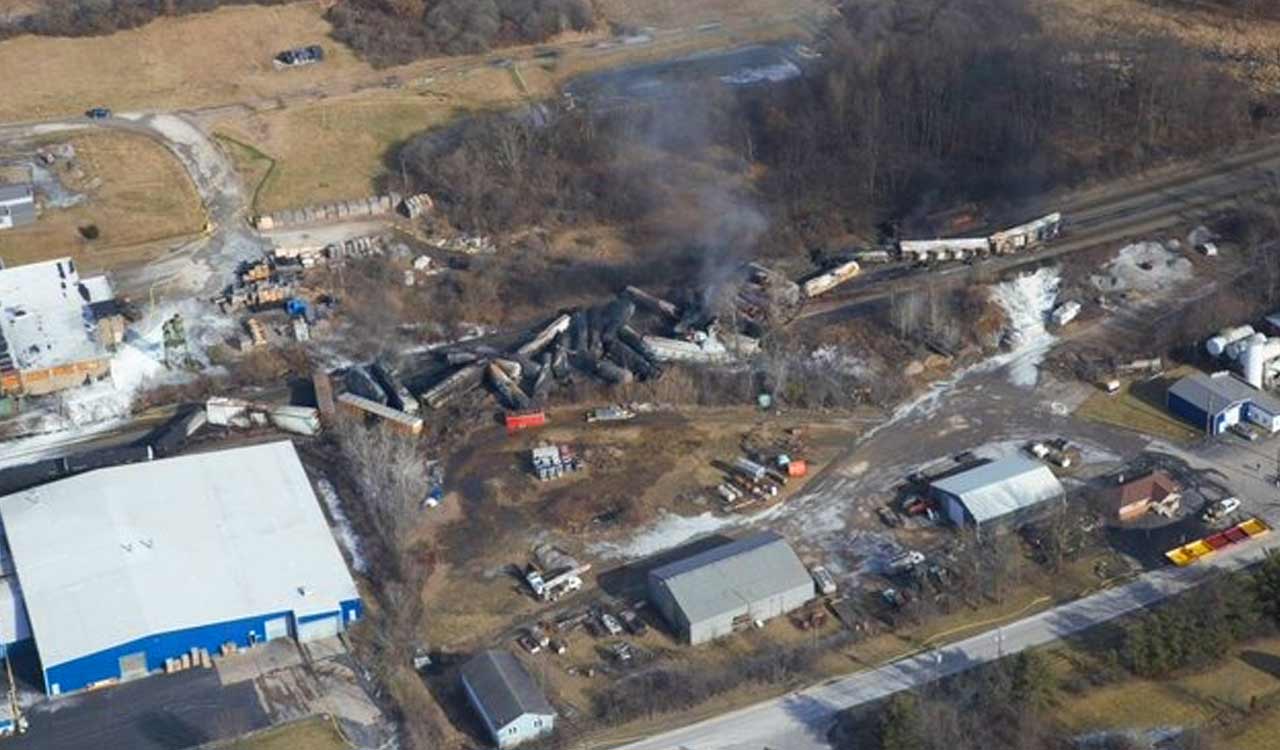US agency releases report on toxic Ohio train wreck
The report released on Thursday said the Norfolk Southern train passed three hot bearing detectors (HBD) on its trip before the derailment on the night of February 3, reports Xinhua news agency.

Washington: The National Transportation Security Board (NTSB), a US federal agency, has released a preliminary report on the derailment of a train carrying hazardous chemicals in East Palestine, Ohio, earlier this month.
The report released on Thursday said the Norfolk Southern train passed three hot bearing detectors (HBD) on its trip before the derailment on the night of February 3, reports Xinhua news agency.
Also Read
The function of the HBD is to detect overheated bearings and provide audible real-time warnings to train crews.
One of the HBDs “transmitted a critical audible alarm message instructing the crew to slow and stop the train to inspect a hot axle”, according to the report.
After hearing the warning, the train engineer “increased the dynamic brake application to further slow and stop the train” and the crew later observed fire and smoke and notified the dispatcher of a possible derailment.
The derailed equipment included 11 tank cars carrying hazardous materials that subsequently ignited, fueling fires that damaged an additional 12 non-derailed railcars.
First responders implemented a one-mile evacuation zone surrounding the derailment site that affected up to 2,000 residents.
There were no reported fatalities or injuries.
Responders mitigated the fire on February 5, the NTSB report stated. But five derailed “specification tank cars carrying 115,580 gallons of vinyl chloride” continued to concern authorities because the temperature inside one tank car was still rising.
This increase in temperature suggested that the vinyl chloride was undergoing a polymerization reaction, which could pose an explosion hazard.
Vinyl chloride is a colourless gas that burns easily. It does not occur naturally and must be produced industrially for its commercial uses.
Vinyl chloride exposure is associated with an increased risk of a rare form of liver cancer as well as primary liver cancer, brain and lung cancers, lymphoma, and leukemia.
The NTSB said on Thursday that responders scheduled a “controlled venting” of the five vinyl chloride tank cars to release and burn the vinyl chloride and dug ditches to contain released vinyl chloride liquid while it vaporized and burned.
The controlled venting began on February 6, which discharged toxic and potentially deadly fumes into the air.
While residents were allowed to return to their homes in East Palestine two days later, they remain concerned about the handling of the incident as well as the health impact of exposure to those chemicals.
The hazardous material tank cars have been decontaminated, the NTSB said.
The agency’s investigators returned to Ohio earlier this week to “examine each hazardous material tank car, document damage, and secure evidence for laboratory analysis”.
It added that the investigation is ongoing and will focus on the wheelset and bearing; tank car design and derailment damage; a review of the accident response, including the venting and burning of the vinyl chloride; and railcar design and maintenance procedures and practices, among other things.
Transportation Secretary Pete Buttigieg visited East Palestine on Thursday morning amid criticism that the response from the federal government to the incident has been slow and inadequate.
“This morning I’m in East Palestine, Ohio, to see the site of the Norfolk Southern derailment, hear updates from investigators, and meet first responders,” Buttigieg tweeted.
Buttigieg’s trip to East Palestine, a village in northeastern Columbiana County, Ohio, came a day after former President Donald Trump visited the site of the train derailment.
Trump said that he thinks it is “terrible” that his successor President Joe Biden has not yet visited the village.
East Palestine Mayor Trent Conaway told reporters during Trump’s visit that this has been a “very difficult situation” as the village is struggling to deal with the fallout of the derailment.
Norfolk Southern announced on Wednesday that it would excavate the soil and replace the tracks in the derailment area “as part of an enhanced remediation plan”.
The railroad corporation said it had excavated more than 4,800 cubic yards of soil, or approximately 400 truckloads.
Additionally, 1.7 million gallons, or approximately 200 tanker loads, of liquid had been collected for disposal.
Related News
-
NHRC flags misuse of its name and logo by NGOs
6 mins ago -
DMDK joins DMK-led alliance ahead of Tamil Nadu polls
8 mins ago -
Telangana High Court allows State, Centre three weeks to file counters on plea against GHMC split
15 mins ago -
Editorial: Big challenges for India’s Quantum leap
20 mins ago -
Opinion: And the Animal asked the Human…
29 mins ago -
Two Belgian Malinois sniffer dogs inducted into Kothagudem district police force
55 mins ago -
Casagrand Introduces Hyderabad’s First UPARTMENT with the launch of Casagrand Mandarin in Miyapur
59 mins ago -
Cheques distributed to women at Nava Women Empowerment Centre
1 hour ago




